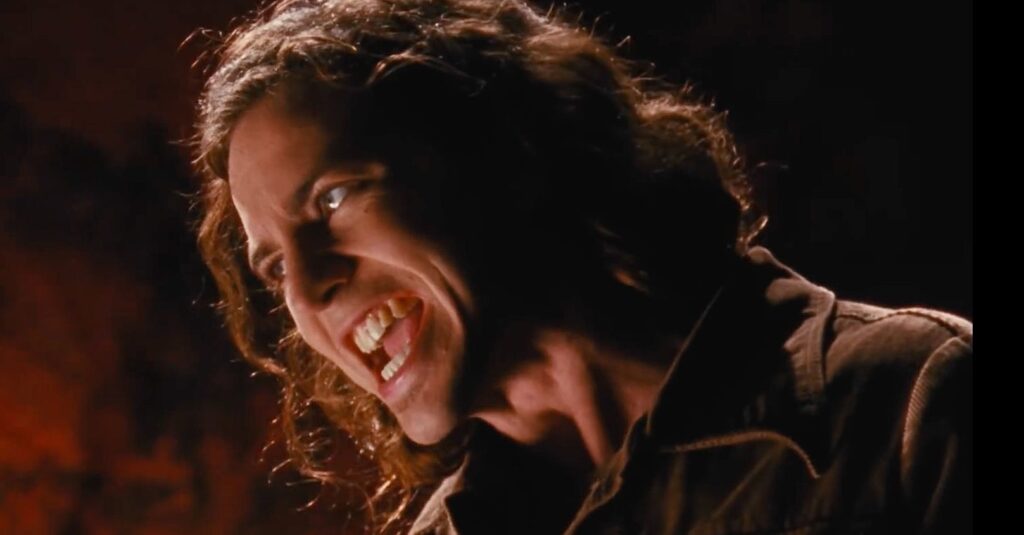
Today, I explain why Pearl Jam handled the inspiration for “Jeremy” so poorly.
In Remember to Forget, we spotlight pop culture stories that I wish I could forget, but I can’t, so I instead share them with you all, so you’re stuck in the same boat as me!
July will be a month not to remember, as it is Remember to Forget Month!
A while back, I did a Cronin Theory of Pop Culture about “inspired by true events” stories“Jeremy.”
https://www.youtube.com/watch?v=MS91knuzoOA
Now, obviously, the song is really well done. It’s very catchy. However, it also makes up some stuff about a real life teen who killed himself that Eddie Vedder has been very open about being the inspiration behind the song.
As Vedder noted years ago, “It came from a small paragraph in a paper which means you kill yourself and you make a big old sacrifice and try to get your revenge. That all you’re gonna end up with is a paragraph in a newspaper. Sixty-four degrees and cloudy in a suburban neighborhood. That’s the beginning of the video and that’s the same thing in the end; it does nothing … nothing changes. The world goes on and you’re gone. The best revenge is to live on and prove yourself. Be stronger than those people. And then you can come back.”
He also added that it was partially inspired by an incident from his youth, “I actually knew somebody in junior high school, in San Diego, California, that did the same thing, just about, didn’t take his life but ended up shooting up an oceanography room. I remember being in the halls and hearing it and I had actually had altercations with this kid in the past. I was kind of a rebellious fifth-grader and I think we got in fights and stuff. So it’s a bit about this kid named Jeremy and it’s also a bit about a kid named Brian that I knew and I don’t know … the song, I think it says a lot. I think it goes somewhere … and a lot of people interpret it different ways and it’s just been recently that I’ve been talking about the true meaning behind it and I hope no one’s offended and believe me, I think of Jeremy when I sing it.”
Okay, but then the actual song is called “Jeremy” and it includes:
Daddy didn’t give attention
Oh, to the fact that mommy didn’t care
King Jeremy the wicked
Oh, ruled his world
What the heck, dude? These people had their son kill himself, and then some rock band wrote a hit song about how the father didn’t give him attention and the mother didn’t care?
If this was some kid that Vedder knew that DID have said problems with his parents, then fair enough, but it ISN’T, it is a fictionalized account based on a real kid Vedder didn’t know and just read an article about, and yet using the name of the kid who killed himself.
I think when you’re dealing with the death of a teenager, such a sensitive subject deserves more care than to simply throw out shots at the kid’s parents based on nothing.
If you or someone you know needs help, contact the National Suicide Prevention Lifeline at 1 800-273-TALK (8255) or through chat available 24/7.










The supposedly nonfiction diary “Jay’s Journal” about a teen’s descent into Satanism and suicide was author Beatrice Sparks taking the diary of a kid who’d committed suicide, adding in Satanism (it was the early 1970s — Satanism sold) but leaving enough details people in the area could figure out who the kid was (all this according to the book “Unmask Alice”).
Ugh, that is a good deal worse than this, but both suck.
I’ve done quite a bit of research into the background of this song, and I don’t think Eddie Vedder fictionalized anything. I think he got interested in Jeremy after he read the article about his death and then lifted the details of Jeremy’s life directly from the police report on his suicide.
According to the police report, Jeremy told people that he felt like his father, who he lived with at the time, didn’t care about him, and one of Jeremy’s friends called his mother because she was concerned about the boy’s mental health, but she got the impression that the mom wasn’t interested. One of the officers himself also said Jeremy’s father seemed unaffected by his son’s death.
On the other hand, the police report also said that Jeremy’s father participated in family counseling with him, had spent the evening prior to his death watching a movie with him, and had contact with him twice on the morning of his death to make sure he got to school. That doesn’t exactly sound like an uninvolved dad. The police report also said Jeremy’s mother was crying and very upset when she was informed of her son’s suicide.
The truth is it can be very hard to judge people’s real feelings from limited interactions with them, and today we know that there is no single “right” way to react to trauma and grief. Also, Jeremy was a troubled teen, and he may not have had an accurate or stable view of his parents when he made remarks about them to other people. Apparently, he had a tendency to play fast and loose with the truth anyway. So, it’s debatable how much we can really know about Jeremy’s parents and their relationship with him from a police report.
Ultimately, even though Vedder probably did his research before he wrote the song, it’s questionable whether he should have publicly identified his inspiration in the way he did. He could easily have left Jeremy’s real name out of it, which would have protected the privacy of a minor child, who deserved dignity in his untimely death, and his family, who deserved to grieve their loved one’s memory in peace.